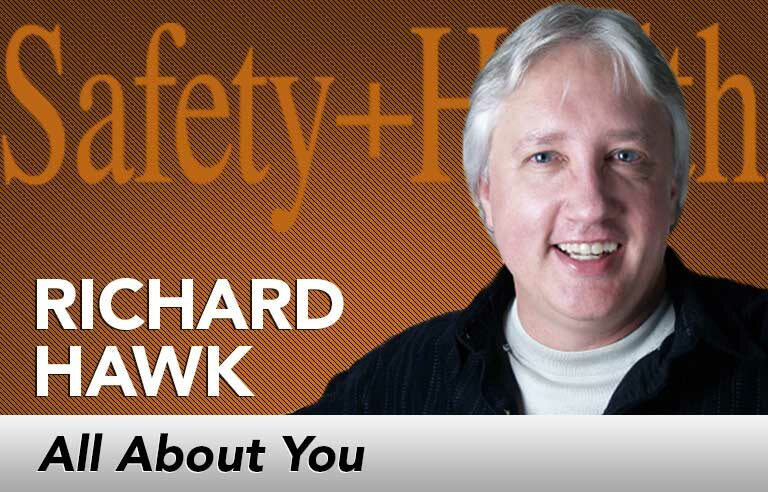All About You: Take the time to be friendly

EDITOR’S NOTE: Motivating employees to work safely is part of the safety professional’s job. But who motivates the motivator? In this monthly column, veteran safety pro and professional speaker Richard Hawk offers his entertaining brand of wisdom to inspire safety pros to perform at their best.
How friendly are you? This may seem like a simple question, but it’s not. A wide range of situations determines friendliness – perhaps more than any other learned social skill, natural ability and inclination. Your level of friendliness is different when you’re at a party with friends than when you go to a business meeting and don’t know most of the attendees. How about strangers? Are you as friendly with them as you are with your golf pals? Of course not.
It feels good to be friendly, and we tend to like friendly people more than those who are stern and reserved. Although some friendliness can be fake, like the friendliness a salesperson shows as he or she tries to talk you into a purchase, sincere friendliness has the power to warm hearts – and increase your influence as a safety and health professional.
When I was a full-time safety pro in the nuclear industry, I spent most of my time in the field “making friends.” Sure, I inspected worksites and checked equipment, but my main purpose was to get to know everybody and have them enjoy my company. I know that may sound strange and seem like I wasn’t doing my job, but that’s not what happened. Employees confided in me. I found out about things that were going on in a way I never could have if I was just a safety and health enforcer who went around looking for violators and problems. Plus, I had a good time.
How to be friendly
Friendliness is something we need to express now more than ever. You and I have seen so much unfriendliness these past few months. For me, it’s been heart-wrenching because it’s so needless. We all can be friendly.
You don’t have to be gregarious or the life of the party to be friendly. Although I tend to joke around a lot and am certainly not quiet or shy, these aren’t what make a person friendly. One basic meaning of being friendly means you’re “kind and pleasant.” When you visit a jobsite, you don’t have to slap everyone on the back and tell a joke, but you should have an endearing attitude, one that makes the crew glad to see you. To do that, you need to show mostly pleasant expressions, listen actively with patience and show a sincere caring spirit.
Sincere friendliness has the power to warm hearts – and increase your influence as a safety and health professional.
I practice my friendliness often. If you’ve read at least a few of my articles, you know I’m a strong proponent of purposely practicing life skills, including social skills, and this one is no exception. Nearly every time I go to a store, restaurant or gas station, I remind myself to be friendly. Sometimes I evaluate how I did. Although, at times, I attempt to be entertaining (with mixed results), I strive to be kind and pleasant every time I’m interacting with people who are serving me.
Even when you have to counsel someone on their safety behavior, you should still be friendly. You’re not going to change a person’s beliefs and habits by being mean. You may not by being friendly either, of course, but you’re more likely to influence them with positive emotions than negative ones. Antonyms of being friendly include being “hostile” and “unfavorable.” I don’t want either of those adjectives to describe how I act, and I’m sure you don’t either. When the situation warrants it, you may need to be straightforward and show a stern nature, but you don’t have to be mean.
Being friendly is a joy – at least for me. Even when I’m having severe problems in my life, it lifts my spirits to be kind and pleasant. On a grand scale, friendliness is a powerful attribute that can counteract all kinds of social turmoil. And my personal experience has shown me it’s a proven way to increase your influence as a safety and health pro.
This article represents the views of the author and should not be construed as a National Safety Council endorsement.
Richard Hawk helps safety professionals become better leaders through his keynotes, workshops, articles and books so they can create vibrant safety cultures. His popular “Mindfully Safe” keynote teaches employees how to focus better and improve their situational awareness, a key skill to preventing incidents. To contact Richard, visit makesafetyfun.com.
Direct to your inbox: Sign up to be notified in email about new "All About You" columns.
Listen on Soundcloud or Stitcher
Post a comment to this article
Safety+Health welcomes comments that promote respectful dialogue. Please stay on topic. Comments that contain personal attacks, profanity or abusive language – or those aggressively promoting products or services – will be removed. We reserve the right to determine which comments violate our comment policy. (Anonymous comments are welcome; merely skip the “name” field in the comment box. An email address is required but will not be included with your comment.)

